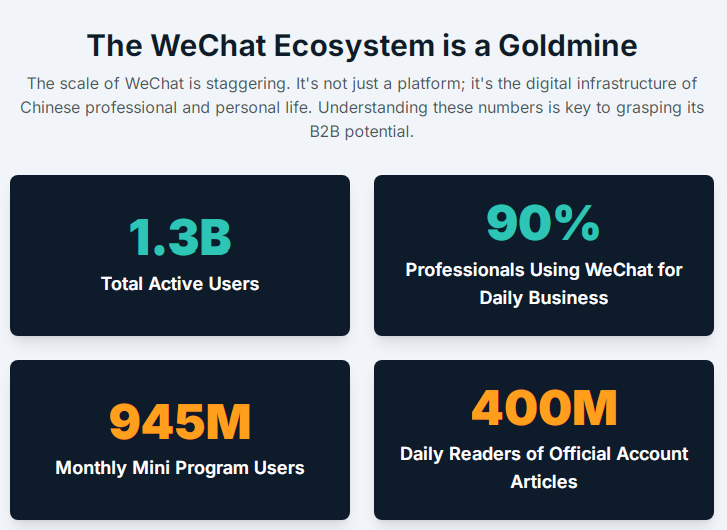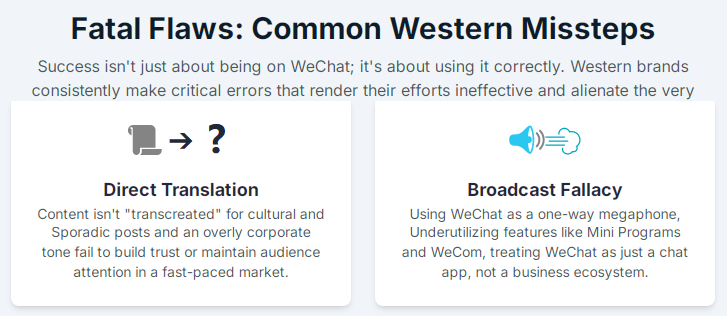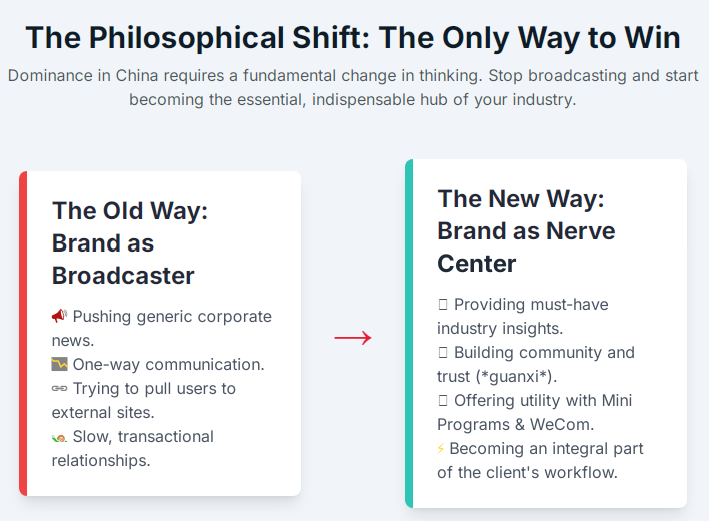Why Your WeChat Account Has Fewer Followers Than a Noodle Shop
Here’s a brutal truth: Most Western B2B companies in China are failing spectacularly on WeChat. While local businesses—even small restaurants—build thriving communities, global brands with million-dollar marketing budgets struggle to get noticed.
The numbers don’t lie. In China’s $7 trillion industrial market, 90% of professionals use WeChat for business communication daily. Email? Forget it. WeChat messages see 95% open rates compared to email’s dismal 20%. Yet Western companies keep treating WeChat like just another social media platform.

The Real Problem
Western brands make three fatal mistakes:
First, they translate instead of adapting. Copying English content into Chinese doesn’t work. Chinese B2B buyers want locally relevant insights, not recycled Western case studies about companies they’ve never heard of.
Second, they broadcast instead of engaging. These companies post monthly updates like they’re running a corporate newsletter. Meanwhile, local competitors are having real conversations, building relationships, and closing deals in WeChat chat rooms.
Third, they underestimate the platform. WeChat isn’t just messaging—it’s China’s business infrastructure. Companies handle everything from lead generation to contract signing within the app. Miss this, and you’re locked out of how business actually gets done.

What Success Looks Like
Smart companies are already winning. A European industrial equipment manufacturer saw a 300% increase in buyer engagement after moving sales conversations from email to WeChat. Their sales cycles shortened by 42%. A Swedish automation firm generated 50% more leads through WeChat technical guides than traditional advertising.
The difference? They stopped thinking like Western marketers and started acting like Chinese businesses.
The Playbook That Works
Build Your Industry Hub
Your WeChat account should become the go-to resource for your industry. Publish weekly insights, share practical tips, and break down complex topics. Chinese professionals follow accounts that make them smarter, not ones that constantly pitch products.

Use the Right Tools
WeChat offers features most Western companies ignore:
- WeCom lets your sales team manage relationships professionally while maintaining personal connections
- Mini Programs create interactive experiences without forcing users to leave WeChat
- WeChat Pay handles invoicing and payments seamlessly
Create Real Communities
Start industry-specific WeChat groups. Share exclusive insights, facilitate discussions, and connect peers. Chinese business culture values relationships (guanxi) over transactions. Build the relationship first; sales follow naturally.
Get Your Advertising Right
WeChat’s targeting is incredibly precise. You can reach decision-makers by industry, company size, and job function. Partner with local Key Opinion Leaders (KOLs) who already have your audience’s trust. Their endorsement carries more weight than any corporate ad.
The Cultural Reality
China’s business culture runs on relationships, not cold outreach. Trust takes time to build but pays dividends for years. WeChat facilitates this perfectly through ongoing conversations, group interactions, and shared experiences.
Local competitors understand this instinctively. They’re fast, culturally aware, and deeply embedded in professional networks. They don’t just sell products; they become indispensable resources their customers can’t imagine working without.
Making the Switch
The shift from “brand as broadcaster” to “industry nerve center” isn’t just tactical—it’s philosophical. Your WeChat account shouldn’t be a marketing channel; it should be business development headquarters.
This means consistent posting schedules, immediate response times, and genuine value creation. Chinese professionals expect brands to be available, helpful, and engaged. Meet these expectations, and you’ll build the kind of relationships that drive long-term business success.
The Bottom Line
WeChat dominance in China requires abandoning Western digital marketing playbooks. Email campaigns, LinkedIn outreach, and quarterly content calendars won’t cut it. Success demands understanding that in China, business happens in chat rooms, relationships matter more than logos, and trust is the only currency that counts.
The companies winning in China have already made this shift. They’ve stopped asking “How do we use WeChat?” and started asking “How do we become indispensable to our customers’ daily workflow?”
The choice is stark: Adapt to China’s digital reality or watch local competitors eat your lunch while you wonder why your expensive global brand carries no weight in the world’s second-largest economy.
Your WeChat strategy isn’t just about social media—it’s about whether you’re serious about China at all.
